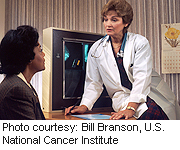- 7 Best Breads for Maintaining Stable Blood Sugar
- Gelatin vs. Collagen: Which is Best for Skin, Nails, and Joints?
- The Long-Term Effects of Daily Turmeric Supplements on Liver Health
- Could Your Grocery Store Meat Be Causing Recurring UTIs?
- Are You Making This Expensive Thermostat Error This Winter?
- Recognizing the Signs of Hypothyroidism
- 10 Strategies to Overcome Insomnia
- Could Artificial Sweeteners Be Aging the Brain Faster?
- Techniques for Soothing Your Nervous System
- Does the Water in Your House Smell Funny? Here’s Why
Family History of Breast Cancer Doesn’t Worsen Patient’s Prognosis: Study


Breast cancer patients who have a family history of the disease often worry that their outlook is worse and their chances for recurrence is higher.
But a new British study of nearly 3,000 women treated for breast cancer suggests those fears may be unwarranted — at least for women 40 and younger.
Patients whose close relatives had experienced breast or ovarian cancer — which also raises breast cancer risk — had no greater risk of their cancer returning over roughly six years of follow-up, regardless of tumor type, than women without a family history, the researchers said.
“A family history of breast cancer does not in itself mean that the outcome will be worse from breast cancer,” said study researcher Dr. Ramsey Cutress, an associate professor in breast surgery at the University of Southampton.
About one-quarter of breast cancers are thought to be hereditary in nature, the researchers said in background notes with the study, published May 20 in the British Journal of Surgery.
Having a mother, sister or daughter who has had breast cancer doubles a woman’s risk of developing breast cancer, according to the American Cancer Society. But it doesn’t boost the odds that the disease won’t be treatable, the new study concluded.
The findings should reassure young women “that their cancer should be treated in the usual way, and that the family history alone will not impact on their outcome,” Cutress said.
The women in the study were diagnosed from 2000 to 2008 and treated at 127 U.K. hospitals. Cutress and his team recorded tumor characteristics and asked each patient about family history.
About one-third had at least one close relative with a history of breast or ovarian cancer. But at the five-year mark, 75 percent of those without a family history were still disease-free, compared with 77 percent of those whose first-degree relatives (mother, sister or daughter) had had either cancer. That difference was not significant from a statistical point of view.
Previous studies have produced a mix of results, Cutress said, with some suggesting better survival for those with a family history, others worse and still others no difference.
The study conclusion wasn’t unexpected, said Dr. Otis Brawley, chief medical officer for the American Cancer Society, who wasn’t involved in the study.
“The finding that women with a positive family history can be reassured that it is not a significant independent risk factor for breast cancer outcome is good news,” Brawley said.
The researchers noted that the study has some limitations, including the women self-reporting their family history. However, that approach has been found reliable, the researchers said. Also, the study involved only young women — the median age was 36.
“I would still advise women with a known family history to be diligent,” Brawley said.
More information
To learn more about risk factors for breast cancer, see the American Cancer Society.
Source: HealthDay
Copyright © 2026 HealthDay. All rights reserved.










